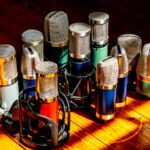Electric guitars have captivated musicians and audiences since their emergence in the early 20th century. While various colors and finishes have adorned these instruments over the years, the black electric guitar holds a particularly iconic and enduring appeal. From the early days of rock and roll to modern genres, black guitars have been the choice of countless legendary players. But why is black such a popular color for electric guitars? Let’s explore the history, types, and enduring allure of the Electric Guitar Black.
The Enduring Appeal of Black Electric Guitars
The color black exudes a sense of sophistication, power, and versatility. For electric guitars, this translates into a visual statement that complements a wide range of musical styles and personal aesthetics. A black electric guitar can look equally at home in the hands of a blues player, a hard rock icon, or a contemporary indie artist. This visual versatility is a significant part of its enduring popularity.
Historically, black finishes on guitars also became associated with certain eras and genres. Think of the classic black Fender Stratocasters and Telecasters favored by rock and blues legends, or the sleek black Les Pauls synonymous with hard rock and heavy metal. This association with iconic musicians and genres further cements the black electric guitar as a timeless and desirable instrument.
A Look Back: The History of Black Electric Guitars
While the original article notes the invention of the electric guitar in 1931 and the rise of early manufacturers like Rickenbacker and Gibson, it doesn’t specifically delve into color trends. However, black finishes were present relatively early in electric guitar history. As electric guitars gained popularity, particularly in the mid-20th century, black became a standard and frequently chosen color option.
Gibson’s ES-150, mentioned in the original article as one of the first production electric guitars, was available in sunburst finishes, but black soon followed as a popular choice for Gibson and other manufacturers. Fender, with their Broadcaster/Telecaster and Stratocaster, also quickly adopted black as a standard color, recognizing its broad appeal. The accessibility and classic look of black electric guitars made them a staple across different brands and models.
Black Finishes Across Different Types of Electric Guitars
The original article outlines the main types of electric guitars: solid body, semi-hollow body, and hollow body. Black is a common finish option across all these types, each style leveraging the color’s aesthetic in unique ways.
Solid Body Black Electric Guitars
Solid body guitars, known for their sustain and versatility, are perhaps where black electric guitars are most prevalent. The Fender Stratocaster, Telecaster, Gibson Les Paul, and SG – all mentioned as popular solid body models – are iconic in their black finishes.
- Black Stratocasters: The black Stratocaster is synonymous with rock and blues. Its sleek black body, often paired with a white pickguard, is instantly recognizable and has been played by countless guitar heroes.
- Black Telecasters: Equally iconic, the black Telecaster offers a more stripped-down aesthetic. Its simple design in black exudes a no-nonsense, working musician vibe.
- Black Les Pauls: Black Les Pauls project power and aggression, often favored in hard rock and metal genres. The combination of the black finish and gold hardware on some Les Paul models creates a luxurious and imposing look.
Semi-Hollow and Hollow Body Black Electric Guitars
While perhaps less common than on solid bodies, black finishes are also found on semi-hollow and hollow body guitars. On these types, black can lend a touch of modern sophistication to the traditionally warmer, vintage-toned instruments. A black semi-hollow electric guitar can be a stylish choice for genres like blues, jazz fusion, and indie rock, offering a blend of classic tone and contemporary aesthetics. Black hollow body guitars, while rarer, present a striking visual for jazz and blues players who want a more modern edge to their traditional instrument.
Choosing Your Perfect Black Electric Guitar
The original article offers advice for beginners, recommending brands like Squier, Epiphone, and Ibanez. For those specifically seeking a black electric guitar, these brands, and many others, offer a wide range of models in black finishes, suitable for all skill levels and budgets.
When choosing a black electric guitar, consider the following:
- Style of Music: Black guitars are versatile, but certain styles are more associated with specific genres. A black Strat or Tele might be ideal for rock and blues, while a black Les Paul could be perfect for heavier styles.
- Body Type: Solid, semi-hollow, or hollow body – each offers different tonal characteristics and aesthetics. Black is a viable option for each.
- Budget: Black electric guitars are available across all price points. Entry-level models from Squier or Epiphone in black finishes offer excellent value, while high-end black guitars from Fender Custom Shop or Gibson Custom provide premium quality and features.
- Personal Preference: Ultimately, the best black electric guitar is the one that resonates with you visually and sonically.
Does Black Change the Sound of an Electric Guitar?
It’s a common question among guitarists: does the color of a guitar affect its sound? The answer, generally, is no. The finish color itself does not significantly impact the tone of an electric guitar. The primary factors influencing tone are the pickups, wood type, body construction, and hardware.
However, the perception of sound can be influenced by visual aesthetics. A sleek black electric guitar might feel like it should sound powerful and aggressive, which can subtly influence a player’s style and approach. But sonically, a black guitar is the same as a guitar of the same model in any other color.
Conclusion: The Timeless Allure of the Black Electric Guitar
The black electric guitar is more than just a color choice; it’s a statement of style, versatility, and rock and roll history. Its enduring popularity stems from its visual appeal, association with iconic musicians and genres, and availability across various guitar types and price points. Whether you’re a beginner just starting your musical journey or a seasoned pro, a black electric guitar is a timeless choice that will never go out of style. Explore the vast range of black electric guitars available and find the perfect instrument to match your musical vision.


